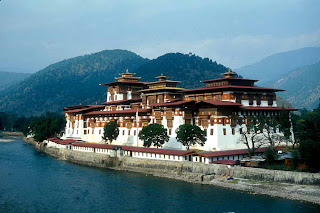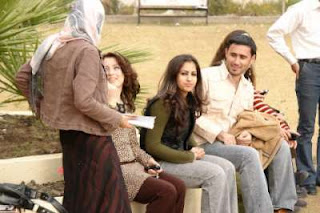Modernizing Kurdistan; A Bhutanese Approach
 |
| Architecture in Bhutan is in harmony with its culture |
The idea for
today’s blog came after a Friday get together with a group of friends who keen
so much love for Kurdistan. We had a wonderful lunch and then we decided
to watch a documentary on the little Himalayan kingdom of Bhutan. As I
was watching the documentary and learning about their philosophy of happiness,
ideas started flourishing; we could possibly consider parts of the Bhutanese
approach in modernizing Kurdistan to meet our people’s needs.
In the United
States and in many other industrialized countries, happiness is often equated
with materialism. Else where in world, a growing number of economists, social
scientists, corporate leaders and bureaucrats are trying to develop
measurements that equate happiness with the flow of money, access to suitable
health care, free time with family, conservation of natural resources and other
non-economic factors.
But to the
Bhutanese, happiness lies in the middle path. Neither overindulging in
the world’s pleasures nor rejecting the world’s goodness can lead to
enlightenment. Happiness can only be found by taking the middle path –
the path that balances the needs of mankind with the spirits of nature.
Economists in
the industrialized societies rely heavily on gross domestic product, or G.D.P
as a predictor of the well being of a nation. But the small Himalayan
kingdom of Bhutan has been trying out a different approach. In 1972, concerned
about the problems afflicting other developing countries that focused only on
economic growth, Bhutan's newly crowned leader, King Jigme Singye Wangchuck,
decided to make his nation's priority not its G.D.P. but its G.N.H., or gross
national happiness.
Their four
pillars of GNH focuses on having a good governance responsive to the people’s
needs, a balanced economic development, preserving the environment and
promoting the Bhutanian culture.
To Bhutanese,
nature is a breathing entity. Damaging nature comes at consequences.
Because of their belief system, they have a very high regard and respect for
the land and their environment. With loans from the government of India, Bhutan
has built several mammoth underground hydroelectric plants. Literature
shows that the Bhutanese pay less for electricity than any other nation in the
world and produce so much power that most of this energy is exported
to India financing the bulk of the government’s budget and granting free health
care and education to every Bhutanese. “We have to look after the
environment, environment should be conserved. We feel that the natural
environment is an integral part of life in Bhutan”, said Bhutan's home minister.
"Material well-being is only one component. That doesn't ensure that
you're at peace with your environment and in harmony with each other", he
continues.
Being a world
traveler myself, there is one thing that is preventing me from traveling to
Bhutan: high visa fees, to reduce the influx of tourists. The high visa
cost goes hand in hand with the GNH philosophy: more tourists might boost the
economy, but they would damage Bhutan's environment and culture, and so reduce
happiness in the long run.
To enhance
happiness is to look after their culture. Bhutan is located between two
humongous nations rich in culture; India and china. To survive, the Bhutanian
felt a must in having a distinctive identity. To feel and smell identity,
you look at the art, the cloths, the infrastructure, the language and the
music. When you look around, you automatically get the sense of the
distinctive Bhutanese culture. Looking at the new architecture set ups in
Kurdistan makes one wonder if the set up is in harmony with the Kurdish culture.
Where do all the ideas for the construction that is currently taking place in
Kurdistan come from? All from the west. How about our art skills,
our video clips and music programs. We take them all, as they are, from the
West. This is how I feel we live; we live off of other people’s thought
process. Other’s invent and we simply consume
It only
bothers me to see American and English names on shops and restaurants as I walk
or drive in Hawler, and mostly misspelled, I regret to say. Where is
the pride in the Kurdish language? Modernization does not translate
into westernization. Westernization both creates and destroys
values. The values destroyed are typically traditional and indigenous
while the new values are more materialistic that fuels consumerism and
civilization.
Now here is
the question, Would it be possible to modernize Kurdistan while preserving the
Kurdish culture and its beautiful nature? Can we make happiness and the
well being of our citizens the number one priority in implementing any system
toward a good governance?



Nice article Helin.
ReplyDeleteI totally agree with your idea about westernization influence on our cities in Kurdistan. There are two problems that I can think of why our cities are taking this path. First, the region has been deprived for so long for development, and once the doors were open just like a sponge it is absorbing everything in. The government is not competent to deal with this flip. The second problem lies in our culture itself, especially among younger generations, having an exaggerated admiration to western societies as a whole. I hope we can reach the point when we rely on ourselves, admire more our culture and values and be efficient to our society.
I remember reading about the Bhutanese priority of happiness a few years ago. They are a blessed country! Excessive materialism is a psychosis of the Western world. Most of the rest of the world has eagerly afflicted itself with this psychosis, and, as you note in your blog, Kurdistan is part of this.
ReplyDeleteBhutan has the good fortune not to have any natural resources that the industrialized world is eager to get its hands on, or their country would have already been wrecked by multinational corporations, just as so many other small countries have been wrecked by insatiable corporate greed. Any country that has oil, gold or other valuable mineral products is condemned to be exploited by big corporations. I have experienced this first-hand in Guatemala and read about it in many other countries. Long may Bhutan live happy and free!
Beautiful Helene!
ReplyDelete